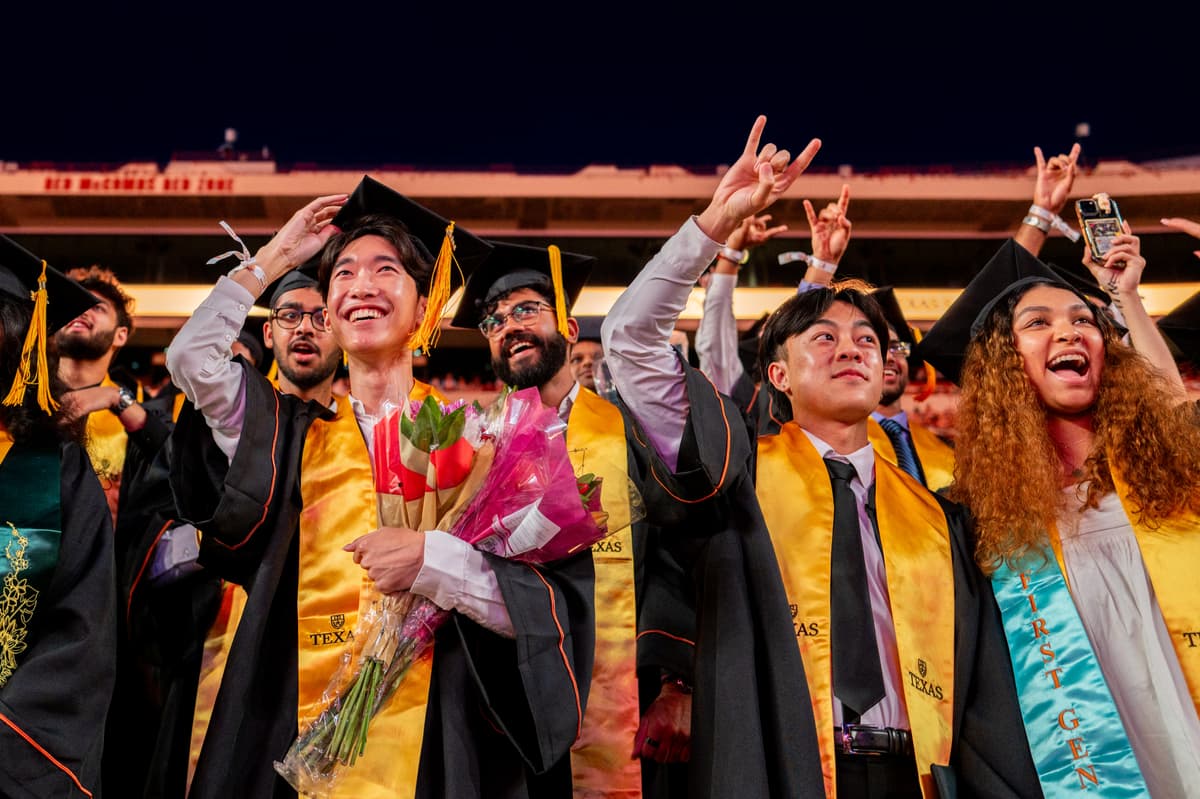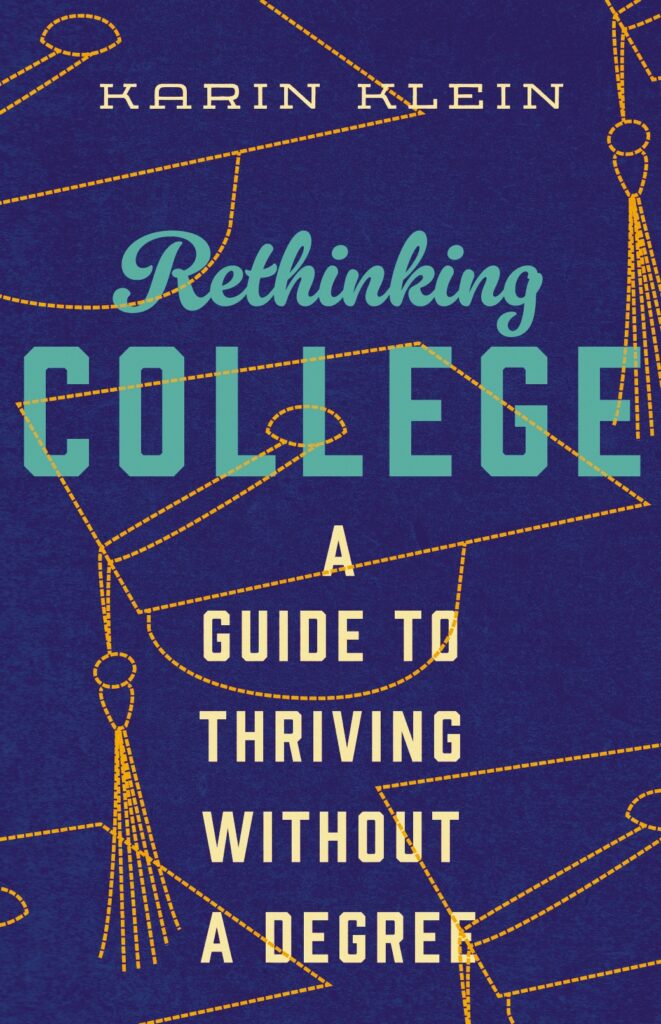College Is So Yesterday — There’s Another Path to the American Dream
An apprenticeship model could better serve young Americans disillusioned by the costs of a four-year degree, according to a leading advocate.

‘Rethinking College: A Guide to Thriving Without a Degree’
By Karin Klein
Harper Horizon, 256 pages
The costs of college are soaring. $37,853 is the average federal student loan debt — which could take a total of 42.8 million Americans each up to 20 years to pay off. Yet there’s no guarantee that a four-year degree will get you a high paying job — as of July, the unemployment rate for people between the ages of 16 and 24 in America was 9.1 percent, more than double the national average.
Is higher education, long viewed as the key to a successful life, no longer the bedrock of the American dream — or even a step away from it?
That’s the exhortation of a Pulitzer Prize-winning journalist for the Los Angeles Times, Karin Klein, in her new book, “Rethinking College: A Guide to Thriving Without a Degree.” She argues that the traditional college-for-all model is growing less relevant and raises a radical idea for America’s youth — don’t go to college, at least not right away.
“I don’t think college is the greatest place to discover what it is you want to do for a living or what you want to do with your life,” Ms. Klein tells the Sun. Those considering it must first determine, she says, “what do you really want a college education for? Is it just to train to get a job? Is it to grow as a person? Is it to explore interests?”

For those who go to college because they don’t know what else to do or are pressured into it, 59 percent later say that college was a waste of money, a researcher at Harvard’s graduate school of education, Michael Horn, has found. University administrations are caught up in a costly “academic arms race,” Ms. Klein says, “to hire the biggest name in a particular field, without necessarily worrying about whether that’s going to mean a better education for the students.”
A four-year degree doesn’t necessarily train students to succeed in the real world — even though many expect it will increase their earning potential. “The ability to network, to lead, to work within a team, to find mentors — these are incredibly important and no one ever teaches students how to do it,” Ms. Klein says.
By no means should Americans do away with higher education, the author says. Neither should it pursue the tuition-free model of German universities, which contain outsized classrooms and struggle to produce high-quality research. A liberal arts education is essential in its teaching of writing and analytical skills and critical thinking.
“I certainly don’t want to see colleges or universities reduced to just being job training places,” Ms. Klein says. “We need the philosophers. They do need to think about what they’re going to do after college because there aren’t that many philosophy professor jobs, so they have to find a way to translate that to the real world.”
There’s another path — one of apprenticeships, which have long existed for skilled trades, like welding and plumbing, but not for white-collar professional jobs, like banking, finance, hospitality, human relations, and customer service.
“Rethinking College” makes this argument based on dozens of interviews with people who dropped out of college or skipped it altogether and still led accomplished careers, whom the author found in a variety of ways including through labor union membership lists, military veteran foundations, Facebook groups, Reddit feeds, and by reaching out to business owners in trade industries, like the surprisingly lucrative field of underwater welding.
Inspiration lies in Switzerland, which boasts an apprenticeship system known as vocational education & training. More than 60 percent of Swiss teenagers elect to spend two years in this system, learning part-time in a classroom and working part-time in businesses across fields like health care, retail, banking, engineering, and technology. They get to learn and build job skills at the same time — all the while getting paid, which reduces the drop-out rate.
In America, trade schools, while increasingly popular among Gen Z, are far from a fast-track into prestigious careers. It doesn’t help that two-thirds of all open jobs require a bachelor’s or associate’s degree, while nearly two-thirds of business and human resource leaders say they toss out resumes without four-year degrees, even if the applicant was qualified.
Meanwhile, some employers are raising the bar for their hires, expecting them to have not just bachelor’s degrees, but graduate degrees — a trend known as “degree inflation.”
By making it easier for employers to quickly size down their applicant pools, Ms. Klein says, “requiring a higher degree became a form of lazy hiring.”
Yet both business leaders and their employees could benefit from loosening those constraints. During the Covid-19 pandemic, some businesses found new advantages when they became more open to hiring people without bachelor’s degrees amid a shortage of workers. They also bolstered the diversity of their staff, Ms. Klein says, since Black and Latino students are about half as likely to get a bachelor’s degree as white students.
“Companies weren’t losing a thing,” Ms. Klein says. “In fact, they were gaining things, because by training people who didn’t have that education, they trained them in the way that they wanted them trained, and the people were more loyal to the organization.”
Whereas college graduates tend to have a high job turnover rate at the start of their career — costing the companies that invest in training them — non-college educated hires tend to stay at an organization longer and are more willing to grow within it, Ms. Klein says. Now, especially in the technology industry, “companies are starting to get over the idea that a bachelor’s degree means something very special.”
Organizations like Opportunity@Work and One Ten are seeking to shift the labor market toward “skills-first hiring practices,” so that job applicants with talent but without a four-year degree have a better shot at success. While most state government jobs typically still demand a bachelor’s degree, a growing number of states have eliminated the requirement over the past year amid vacancies in government.
To build a white-collar apprenticeship model, however, would involve cooperation between federal and state departments of education and corporate America (the Swiss model, for reference, runs on billions in annual investments from the private sector).
Ms. Klein envisions a dynamic in which trade schools connect with potential employers to publish robust lists of available apprenticeships, provide trainees with support like online courses and set mentoring standards. “No freebie interns fetching the coffee; these apprenticeships require real training and mentorship.”
A nonprofit apprenticeship program called CareerWise Colorado is making strides to elevate this model across the country, asserting that an apprenticeship “is not a diversion from higher education” but “an option multiplier” for one’s professional and educational future.
Take the example of a man interviewed in “Rethinking College,” Benjamin Colbert, who dropped out of a public university in Virginia where he felt he lacked direction and enlisted in the U.S. Coast Guard. At first, he had no particular end goal, but the job inspired his interest in water pollution, and he is now earning a doctorate degree on environmental science and policy. “I’m a case study for why not everybody should go [to college] at eighteen,” he told Ms. Klein.
Over the years of researching and writing her book, Ms. Klein shares, “I realized I had played it a lot safer with my life than I now wish I had.” She earned a bachelor’s at Wellesley and a graduate degree in journalism at Berkeley. So too did her three children go to college. But her mother or her father, who she describes as “smart, well-read people” who devoured the New York Times every morning of their lives, did not. “Being willing to do something different makes for interesting people, and interesting people, I think, do well in this world.”
These success stories beg the author’s questions to the Sun: “What if you went out there and you lived real life for a while and you tried doing some amazing presidential volunteer work? Or worked on farms across the world? Or tried making your own movies or editing your own videos?”
If after such an experience, one did want to apply to college, they would likely stand out as an applicant, Ms. Klein says. They might even get tuition assistance from their employer. They’d be more mature, authentic. More interesting and interested. They would soak up their education like a sponge. “And if you make a bunch of mistakes,” Ms. Klein says with a laugh, “that might make a terrific college essay.”

